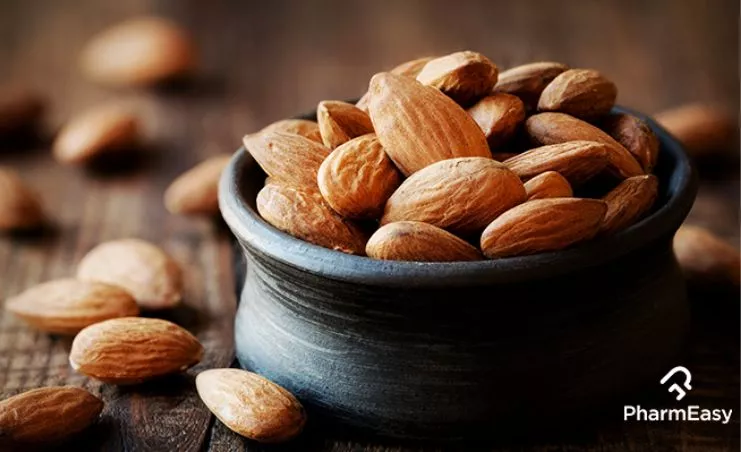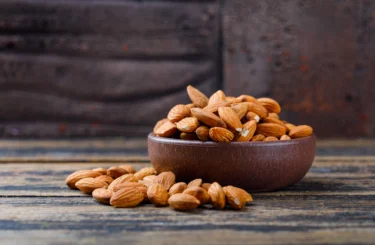Almonds: Uses, Benefits, Side Effects By Dr. Rajeev Singh
By Dr Rajeev Singh +2 more

Get,

to manage your symptom
Get your,


4 Cr+ families
benefitted

OTP sent to 9988776655



You’ve successfully subscribed to receive
doctor-approved tips on
Whatsapp

Get ready to feel your best.

Hi There,
Download the PharmEasy App now!!


Register to Avail the Offer
Send OTPBy continuing, you agree with our Privacy Policy and Terms and Conditions

Hi There,
Sign up on PharmEasy now!!
Trusted by 4 crore+ families

OTP sent to 9988776655



You have unlocked 25% off on medicines




Code: NU25
By Dr Rajeev Singh +2 more
Table of Contents
Relishing an ice cream with almond toppings or a glass of almond milk is a major satisfaction for our taste buds. Almonds, also known as Prunus dulcis, are among the world’s most loved tree nuts. They are one of the oldest tree nuts in the world and are native to the Mediterranean region. In the 16th century, almonds were first introduced in Kashmir by Persian settlers. However, cultivation has now spread to Maharashtra, Kerala, Andhra Pradesh and Tamil Nadu. Locally known as “badam”, these nuts are light in colour, have a semi-hard shell with a wrinkled skin. Depending on the skin, many varieties are available, including green almonds, molar, sanora, ferradual, green almonds, peerless almonds and Carmel almonds; the California variety is considered to be the best. Apart from their use in the kitchen, almonds are packed with the goodness of health! Let’s discover how can this tiny food ingredient move mountains when it comes to health1!

Did you know?
Almonds are highly beneficial due to the presence of various nutritional components. The nutritional value of 100g of almonds is given below2:
The moisturising qualities of almond oil might aid in soothing your dry skin and reducing irritation. According to research, creams containing almond oil may be used topically to relieve eczema and dermatitis symptoms. Additionally, almond oil may help with skin tone and appearance. Almond oil might also assist to hydrate and strengthen your hair and scalp. It might aid in healing damaged hair and taming frizz and moisture. Additionally, almond oil may be able to tackle the signs of a dry, itchy scalp11.
Dr. Anuja Bodhare, B.A.M.S, M.D (Ayu)
The consumption of almonds shows numerous scientifically proven properties; some of these properties are mentioned below:
From my knowledge, almonds contain unsaturated fat, which may raise serotonin levels over the day. Your brain has a hormone called serotonin that may aid in regulating your sleep and waking cycles9. Better sleep at night is a result of higher levels of serotonin during the day.
Dr. Smita Barode, B.A.M.S, M.S.
Some of the potential benefits of almonds are described as follows:

Age-related decline in cognitive function is a major public health issue. Literature reviews suggest that almonds’ nutrients may help improve cognitive function. Jelena et al. conducted a study3 in 2022 to assess the effect of almonds on cognition in the elderly. Six months of consumption of almonds by the elderly showed an improvement in cognition the elderly. This indicates that the consumption of almonds may help improve cognitive function. However, more studies are needed to support these claims.

Almonds may exert cardio-protective effects. Soumik et al. conducted4 a literature review in 2018, the summary estimates of which state that the cardio-protective effect is attributed due to the presence of mono- and polyunsaturated fatty acids (MUFAs and PUFAs), minerals and vitamins like copper, magnesium, calcium, iron, phosphorus, zinc, potassium. In addition, a meta-analysis conducted by Berryman et al. in 2015 supports the consumption of almonds to reduce low-density lipoprotein (bad cholesterol) and maintain high-density lipoprotein (good cholesterol)5. This indicates that almonds may have a positive impact on cardiovascular health. However, more studies are needed to support these claims.

Breast cancer is the most common cancer affecting women worldwide; few literature studies support the anticancer role of almonds. Alejandro et al. conducted a study6 in 2015 to assess the impact of almonds on breast cancer. This study showed higher consumption of almonds was associated with a reduced risk of breast cancer by 2-3 times. This indicates that consuming almonds may help manage breast cancer. However, more studies are needed to support these claims.

Almonds may help in improving the glucose levels in blood, also known as glycaemic levels. Sing-Chung et al. conducted a study7 in 2011 to assess the effect of almond consumption on glycaemic control in type 2 diabetes mellitus. As a result, 12 weeks of almond consumption by the study participants showed a positive impact on glycaemic control. This indicates that the consumption of almonds may help in balancing glucose levels in the blood. However, more studies are needed to ensure these facts.

Almonds are rich in monounsaturated fatty acids, which may help lower inflammatory markers like C-reactive protein. Shahin et al. conducted a literature review8 in 2022 to assess the effects of almond consumption on inflammation. This study showed that daily consumption of almonds might help in reducing inflammation by lowering inflammatory markers like C-reactive protein. This indicates that the consumption of almonds may have a natural anti-inflammatory effect and a beneficial effect on arthritis. However, more studies are needed to support these claims in humans.

Though there are studies that show the benefits of Almonds in various conditions, these are insufficient and there is a need for further studies to establish the true extent of the benefits of Almonds on human health.
I recently read an article which suggests almond milk may act as a fantastic substitute for cow’s milk, whether you have allergies to dairy products or avoid it for other reasons. It is devoid of lactose, and cholesterol, and is frequently enriched with vitamins and minerals.
Dr. Rajeev Singh, BAMS
You must consult a qualified doctor before taking any herbal supplements. Do not discontinue or replace an ongoing treatment of modern medicine with an ayurvedic/herbal preparation without consulting a qualified doctor.
Almonds may be used for making bones stronger. I strongly recommend the consumption of almonds regularly in your diet. Almonds are known for their richness in calcium and phosphorus which may help build stronger bones10.
Dr. Siddharth Gupta, B.A.M.S, M.D (Ayu)
A few side effects related to the consumption of almonds include:
However, if you experience any adverse reactions to almonds, it is advised to discontinue its intake and immediately contact a doctor or your Ayurvedic physician who has prescribed it to you. They will be able to guide you appropriately for your symptoms.
Eating almonds is okay if taken in moderate amounts. However, general precautions must be followed in the following conditions:
Eating almonds is contraindicated in the following conditions:
Also Read: 17 Health Benefits of Dates And Date Recipes
There are no significant interactions of almonds with other drugs. However, you must always seek the advice of your Ayurvedic physician about the possible interaction of almonds with other drugs, and follow the prescription thoroughly, as they will know your health condition and other medications you are taking.
Also Read: Char Magaz: Uses, Benefits and Side Effects by Dr. Rajeev Singh
The scientific name of almonds is Prunus dulcis.
Carmel almonds, widely known as the California variety is considered to be the best.
Yes, almonds may help improve vision because of the presence of an antioxidant, Vitamin E which protects the eye from damage due to free radicals. However, more studies need to be done to support these claims in humans. Therefore, it is advised to consult a doctor for proper treatment.
Yes, almonds have a low level of carbohydrates and high fiber and protein content. So, it may help in weight loss. however, more studies are needed to support these claims. Therefore, it is advised to consult a doctor for a proper treatment and do not consider the consumption of almonds as an alternative to modern medicine.
Consuming almonds in excess can result in diarrhoea, difficulty in swallowing, vomiting and severe itching. Allergy-prone individuals may also experience nut allergies.
Disclaimer: The information provided here is for educational/awareness purposes only and is not intended to be a substitute for medical treatment by a healthcare professional and should not be relied upon to diagnose or treat any medical condition. The reader should consult a registered medical practitioner to determine the appropriateness of the information and before consuming any medication. PharmEasy does not provide any guarantee or warranty (express or implied) regarding the accuracy, adequacy, completeness, legality, reliability or usefulness of the information; and disclaims any liability arising thereof.
Links and product recommendations in the information provided here are advertisements of third-party products available on the website. PharmEasy does not make any representation on the accuracy or suitability of such products/services. Advertisements do not influence the editorial decisions or content. The information in this blog is subject to change without notice. The authors and administrators reserve the right to modify, add, or remove content without notification. It is your responsibility to review this disclaimer regularly for any changes.
Comments

Leave your comment...
You may also like
Comments